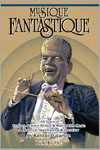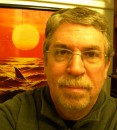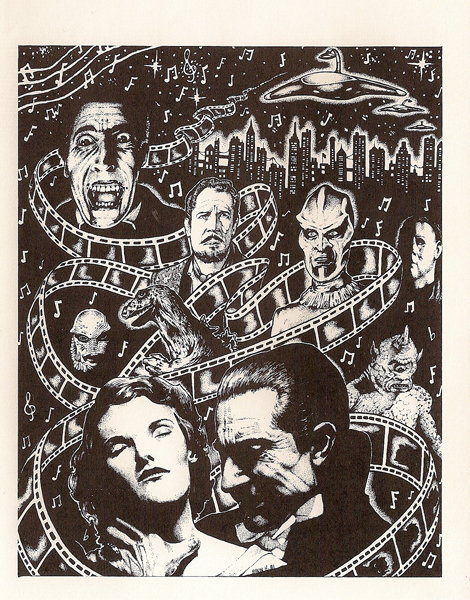The Origin Story of the Long-Lasting Soundtrack Label that had brought many fantasy/sf/horror genre soundtracks to release
by Randall D. Larson
Originally published in CinemaScore #6, April 1980.
Varese Sarabande Records, over the past year or so, has rapidly established itself as a major producer of high-quality soundtrack albums; both reissues of rare and long-sought-after soundtracks in addition to new releases of film scores neglected by the major record companies but well-worth preserving. In their honest concern for film music, coupled with a sense of business professionalism, Varese Sarabande has become a virtual horn-of-plenty for film music enthusiasts, and their prolific output promises to make available many film scores which otherwise would have been relegated to limbo.
The company began in 1977, when Varese International Records (so-named for the modern composer, Edgar Varese) President Chris Kuchler merged his company with the then beginning Sarabande Records(so-named for the music/dance form) company of Tom Null, who became Vice-President of the new company, Varese Sarabande. The first issues of this label were primarily reissues from the now-defunct Urania and Remington classical catalogues. The titles were chosen for their value as highly sought-after titles in the classical collectors market. These early reissues led to the reissue of deleted material from other companies, which ultimately included the MCA/Decca catalogue, resulting in Varese Sarabande reissuing such soundtrack material as A TIME TO LOVE AND A TIME TO DIE (Miklós Rózsa), FOUR GIRLS IN TOWN (Alex North) ,SAMSON AND DELILAH (Victor Young), THIS EARTH IS MINE (Hugo Friedhofer), SILENT RUNNING(Peter Schickele) and Themes from Classic Science Fiction, Fantasy and Horror Films (reissued from the Dick Jacobs album Themes from Horror Movies on Coral, without the narration and sound effects that marred the original’s listenability.
Kuehler and NulI realized that, of their soundtrack reissues, the ones that were consistent best-sellers were those representing the science fiction, fantasy and horror film genres. In order to develop further soundtracks along these lines, Varese Sarabande hired Scot W. Holton in the Spring of. 1979. Holton had a considerable background in, and knowledge of, films in the fantastic genres; he had collaborated with Robert Skotak in writing and editing Fantascene magazine in 1977-78, which specialized in in-depth production retrospectives of classic science fiction films; Holton was also a west coast writer for Starlog and Future magazines and had collaborated with Skotak in writing the book Fantastic Worlds, published by Starlog. Holton joined Kuchler and Null in heading up Varese Sarabande, and these three remain the company principals to [this] date. Holton is in charge of the company’s division producing science fiction/fantasy and horror soundtracks, and it is his role, primarily, to develop material that they feel will be marketable to the fantastic film audience – an audience, Holton believes, which has greatly widened (as far as soundtrack collecting goes) due in large part to the successes of the films and soundtracks of STAR WARS and CLOSE ENCOUNTERS.
A problem, Holton notes, that any legitimate record company must realize is that a primary consideration of any potential soundtrack project is the payment of the Musicians Union Re-use fee. This applies to all music recorded for films in the United States and England, and means simply that, if the music for a film is licensed out for production as a soundtrack album, the Musicians Union must be paid a gain for the “re-use of the music.” Holton would love to produce albums for genre classics such as NIGHT OF THE HUNTER(Walter Schumann), THE THING (Dimitri Tiomkin) , THEM! (Bronislau Kaper), CONQUEST OF SPACE (Van Cleave) and the complete Herrmann score for THE DAY THE EARTH STOOD STILL, but the re-use fee on these pictures is prohibitively expensive [fortunately, this has changed for the better in recent years. –rdl 5/2013]. The re-use fee, however, does not apply to reissued soundtracks: once it has been paid for an original soundtrack release, it is valid indefinitely. Given the limitations of their operating budget, Varese Sarabande has been somewhat restricted to reissues and original soundtracks of music recorded outside the U.S. and England, where the re-use fee does not apply.
Having been a great admirer of Pino Donaggio for DON’T LOOK NOW and CARRIE, the first projects Holton brought to the company was Donaggio’s score for the then-current film, TOURIST TRAP. This involved a relatively simple licensing procedure with the film’s U.S. distributor, Compass International Films, in which Varese paid an agreed-upon royalty per album sold, as well as an advance on an agreed-upon amount of albums that is paid prior to their being sold. This is the common procedure for licensing most albums of film music, either from the film’s producers or its distributors, depending upon who has retained the licensing rights in their contracts.
TOURIST TRAP was followed by soundtracks for the popular films, PHANTASM, scored by Fred Myrow and Malcolm Seagrave, and George Romero’s zombie film, DAWN OF THE DEAD, with music by the Italian rock group, Goblin. Varese Sarabande’s record sales for these two soundtracks reflected the high box office grosses of their films, and they continue to be good sellers. Based upon the growing interest in Pino Donaggio as a classically-oriented film composer, Varese Sarabande decided to go back after PIRANHA, a score he had written three years previous. It also has been a wise choice as the Donaggio market grows. Holton has just recently completed negotiations for releasing Donaggio’s score for Brian de Palma’s new film,HOME MOVIES.
Based on the legion of fans for George A. Romero films, and the popularity of their DAWN OF THE DEADsoundtrack, Holton went back and arranged licensing for a soundtrack of Romero’s earlier vampire film,MARTIN, which had a progressive jazz score by Donald Rubinstein. Varese Sarabande also has a tentative agreement, as of this writing, to release the [library music] score for Romero’s first feature, NIGHT OF THE LIVING DEAD.
The next genre film licensed by the label was Australian composer Brian May’s eerie and mood-setting score for the ESP thriller, PATRICK. May’s scores, like Donaggio’s (but with their individual styles applied), are in the general vein of those of Bernard Herrmann, and both composers seem to be building their own collector’s market. Based on the success of PATRICK, Varese has subsequently licensed for album release May’s score for the forthcoming thrillers, SNAPSHOT (which will be released in the U.S by Group-1 with a title change [THE DAY AFTER HALLOWEEN]) and THIRST. They are currently negotiating for another film entitled MAD MAX.
Concurrent with all this, Tom Null had arranged for the reissue of various genre titles by Les Baxter, includingTHE DUNWICH HORROR, GOLIATH AND THE BARBARIANS, MASTER OF THE WORLD, and newly-released on the Citadel label (recently acquired as a division of Varese Sarabande), CRY OF THE BANSHEEbacked with Baxter’s television scores for various Edgar Allan Poe stories. Also on Citadel is Varese’s newly- remastered and repackaged Horror Rhapsody of Hans J. Salter [a compilation of various Salter classic monster movie scores], backed with HORROR EXPRESS by John Cacavas.
Citadel Records was established in 1976 by film music historian Tony Thomas, primarily for the purpose of issuing, usually from original acetate studio recordings, sound tracks of neglected scores by Max Steiner, Miklós Rózsa, Hans J. Salter, and others; in addition to reissuing soundtracks by Jerry Goldsmith, George Duning, et al. In early 1980, Citadel was acquired by Varese Sarabande, who began to reissue, in remastered and repackaged editions, various titles in the Citadel catalogue. Those items formerly listed in the catalogue as “not licensed for public sale” remain so and will not be re issued by Varese, since many of those titles were licensed between Thomas and the composer on a limited, promotional composer basis and, as the phrase “not for public sale” indicates (despite the fact that most major soundtrack mail-order sources regularly stock the titles), were not licensed for commercial release.
Scot Holton explains the prevalence of fantastic films in the Varese catalog, pointing out that “genre films have a way of building their audiences over the years, whereas if one would consider for a moment the total output of Universal Studios over the years, it is largely forgettable, with the exception of the genre titles.” However, Varese Sarabande is continuing to put equal emphasis on non-genre, mainstream films and composers. Tom Null arranged for the licensing of Laurence Rosenthal’s scores BRASS TARGET andMEETINGS WITH REMARKABLE MEN, along with the Georges Delerue scores for A LITTLE ROMANCEand AN ALMOST PERFECT AFFAIR, Miklós Rózsa’ s FEDORA and Ennio Morricone’s BLOODLINE.
Other related projects headed by Null include the first issuing of Rózsa’s complete score for KNIGHTS OF THE ROUND TABLE (scheduled for Spring 1980) and the reissuing of his scores for KING OF KINGS, BEN-HUR, and EL CID; and from the Colpix catalog, reissues of THE THREE WORLDS OF GULLIVER, THE 7TH VOYAGE OF SINBAD, THE DEVIL AT 4 O’CLOCK, BARABBAS, and 1,001 ARABIAN NIGHTS.
Varese Sarabande has, as well, entered the world of the audiophile market, and has issued two digital recordings of Morton Gould conducting the London Symphony Orchestra. The first album was of Gould’s own compositions [Morton Gould Conducts Morton Gould, 1978], while the second was titled Digital Spaceand was a collection of themes and suites from a variety of films, including science fiction, westerns, and war pictures. Forthcoming are Varese’s first two co-productions with Starlog Records (see CinemaScore #2 for a background article on this company): the first issue of Bernard Herrmann’s score for NORTH BY NORTHWEST, recorded digitally in London by Herrmann’s colleague, Laurie Johnson; and a second album consisting of Johnson’s music for his own films, THE FIRST MEN IN THE MOON, DR. STRANGELOVE, CAPTAIN KRONOS, and HEDDA.
Varese has also recently reissued, in stereo, the rare Leith Stevens score for DESTINATION MOON (see review this issue), and discussion is in progress concerning the possible issuing of his scores for WAR OF THE WORLDS and WHEN WORLDS COLLIDE with Starlog Records. The next science fiction title of a current film which Varese will issue will be Richard Band’s score for THE DAY THAT TIME ENDED, scheduled for Spring 1980 when the film is to be released.
With the currently-popular market for fantastic film soundtracks in mind – and not strictly from a commercially-exploitable standpoint (as the care and quality of the Varese product indicates) – the emphasis of the Varese recordings will continue to focus upon fantastic films, which have themselves been perhaps the most neglected of films to have had soundtracks issued in the past (an unfortunate turn of events resulting in the loss of many examples of this unique and special form of film music). Varese Sarabande has, therefore, done a great service to film music collectors in general – and to aficionados of fantastic film music in particular – by providing many of these current and not-so-current scores on record. Kuchler, Null, and Holton all deserve our thanks for their concern, expertise, and craftsmanship in making available numerous film scores, and showing the more established record companies that there is a viable market for all varieties of soundtrack albums, including those of the fantastic genre. The mouth-watering projects forthcoming from Varese Sarabande will be anxiously awaited!
See Also: “The Real History of Varese Sarabande” by Bruce Kimmel




